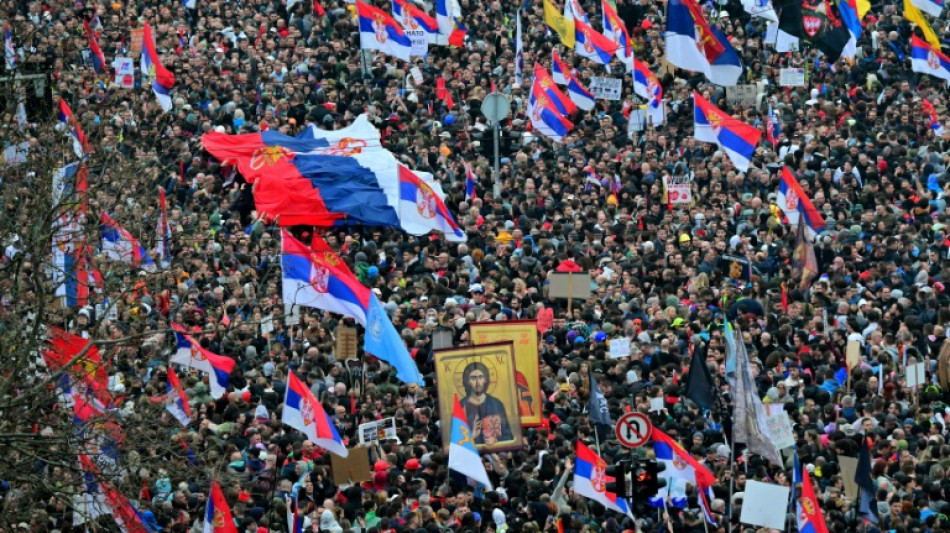

Serbian students, unions join forces for anti-corruption protest
Serbia's trade unions will for the first time join a protest Thursday called by student leaders, six months after the deadly train station tragedy that sparked mass demonstrations against corruption.
Serbia has been gripped by a wave of unrest since 16 people were killed in the collapse of the newly renovated railway station in Novi Sad last November — a tragedy widely blamed on corruption and poor oversight
It has already led to the resignation of the Prime Minister and the fall of the government.
But on May 1, students and members of the five largest unions will gather in front of the Serbian government building in the capital, Belgrade.
The students announced on their official Instagram account that "their struggle enters a new phase".
Zeljko Veselinovic, leader of the "Sloga" (Unity) union, acknowledged the importance of the development in comments to AFP.
"The students have united us," he said.
"In my 20 years of union work, it has never happened that these five unions stood together at a protest — or even in the same room — working on something jointly," he added.
In Serbia, around 500,000 people in the country's 2.36 million-strong workforce are union members, according to the unions' own estimates. These five unions, which cover most sectors of industry, account for most of that membership.
- 'Towards radicalisation' -
The students said that after the protest, they would no longer confine themselves to the blockades that have kept their faculties closed for months.
"This is a step towards radicalisation that will enable new forms of pressure," the students wrote, without elaborating.
They have already called for the prosecution of those responsible for the accident and for charges laid against students arrested during the blockades to be dropped. Now they are pressing for changes to the labour and strike laws.
Many teachers who have supported them have been left without pay for months due to vague laws that allow their employers to stop their wages even when they are not on strike.
"They protect the authorities, not the workers," said the students of the current legislation. "These laws must be changed."
- Backing from the bereaved -
The students' protests have been backed by the likes of Dijana Hrka, whose 27-year-old son Stefan died in the November tragedy.
She has followed their actions from the beginning and can often be seen at protests, greeting and hugging demonstrators with tears in her eyes.
"They are the ones who gave me the wind beneath my wings," she told AFP.
"If it hadn't been for them, I probably wouldn't be able to function," she added.
"They are fighting for me...," she said, stressing that for her and the protesters, corruption was at the root of the tragedy.
"I realised that our country's leadership cares neither for the children nor for the people... They only care about money."
Across Serbia, there have been student-led protests almost daily over the past six months, the largest of which have gathered hundreds of thousands of people.
Ahead of each major demonstration, students have spent weeks touring the country on foot, trying to reach people in the country's smaller towns -- traditional strongholds of the ruling party.
One group of 80 students even cycled to Strasbourg to alert European institutions to the situation in Serbia, while a group of ultra-marathoners is making its way towards Brussels with the same goal.
- Investigation -
The investigation into the disaster has made little progress said Hrka's lawyer, Ivan Ninic.
"In these six months, the investigation should have been completed, charges filed, and the trial underway," Ninic told AFP.
On December 30, prosecutors did formally file criminal charges against 13 people, including a former transport minister, for endangering public safety. The Serbian court however returned the indictment for further investigation.
"What does that mean -- that the prosecutor conducted the preliminary investigation poorly and failed to carry out prosecutorial actions with sufficient quality," Ninic said
Parallel to the investigation into the tragedy, the Prosecutor's Office for Organised Crime is also examining potential corruption during the reconstruction of Novi Sad railway station.
And the European Public Prosecutor's Office (EPPO) has launched its own investigation into possible misuse of EU funds related to the reconstruction of the railway line and station.
D.Riva--MJ




